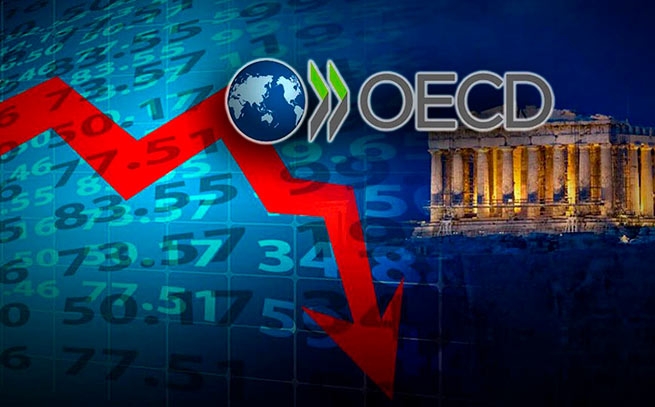Greece is the only country EUwith no real economic growthaccording to data presented in the semi-annual report of the OECD (Organization for Economic Cooperation and Development).
The report predicts growth of 2.2% this year, below the official forecast of 2.3% for the Greek economy, and 1.9% in 2024, which is negligible when you take into account the huge amount of money the EU is offering Greece. through the Recovery Fund, as well as an inflation forecast of 3.9%!
So basically we’re talking about a recession that’s well over 1%, and it’s reasonable to ask, “If there were no Recovery Fund, what would happen”? The Greek economy would literally turn into “dust and fragments.”
Therefore… “growth” in 2023 will be driven primarily by fixed investment, which is expected to increase by 8.9% as the pace of implementation of the Recovery and Resilience Fund picks up.
Private consumption is expected to slow to 1.7% from 8% in 2022 due to lower household purchasing power caused by inflation. This in itself testifies to the … “growth” that Greek society expects.
The agency’s forecast also sees a 0.2% decline in exports of goods and services this year compared to a 4.5% growth last year and an increase in imports of 6.7% compared to 10.2% last year, which will lead to a negative contribution of the external sector to GDP.
It is noted that the commission requires that in the coming years the country showed a surplus of more than … 2%. Based on the Stability Program, Athens appears to have discounted the size of the adjustment by revising its primary surplus target for 2023 to 1.1% of GDP from its original budget estimate of 0.7% of GDP.
In subsequent years, this figure will increase even more: to 2.1% of GDP in 2024, 2.3% in 2025 and 2.5% in 2026, with austerity measures exceeding 6 billion euros in the last year.
We say “austerity” because that’s another name for a surplus. The new surpluses and caps on primary spending introduced in the Stability Pact are making the new government’s incentive program more difficult, as this can only be done by reversing the measures and changing the tax structure.
The OECD forecasts a 4.2% recovery in exports in 2024, which, combined with a 3.4% slowdown in import growth, will lead to a small positive contribution of the external sector to GDP. In 2024, private consumption is predicted to continue its low flight (growth by 1.6%), while investment growth will slow down to 4.4%, in short, Greek society will again live through the times of the memorandum.
In the last quarter of 2022 and early 2023, real consumption continued to rise, reflecting strong employment growth, while employment growth slowed in 2023 due to capacity constraints. The unemployment rate is projected to fall from 12.4% last year to 11.2% this year and further to 10.4% in 2024.
As for harmonized inflation (based on the Eurostat price index), the OECD notes that it has been declining since September 2022 and was 4.5% in April, but received a wider base, with structural inflation reaching 6.1% in the same month. She predicts it will decline from 9.3% last year to 3.9% this year and further to 3.2% in 2024. But for structural inflation, which excludes energy, food, alcohol and tobacco prices, she predicts a rise from 4.6% last year to 5.5% in 2023 and a decline to 3.3% in 2024.
Note that inflation by itself is… undergrowth as it far exceeds any rate of growth projected in the report. The ongoing labor shortage is fueling wage growth, the OECD notes, adding that the pace of wage growth accelerated, with the minimum wage rising 9.4% in April, after rising about 10% in the first half of 2022.







More Stories
EU employment record: Greece "stuck" in a low position
“Bonus” of 300 euros for the long-term unemployed
Turkish tourists choose Samos for their holidays